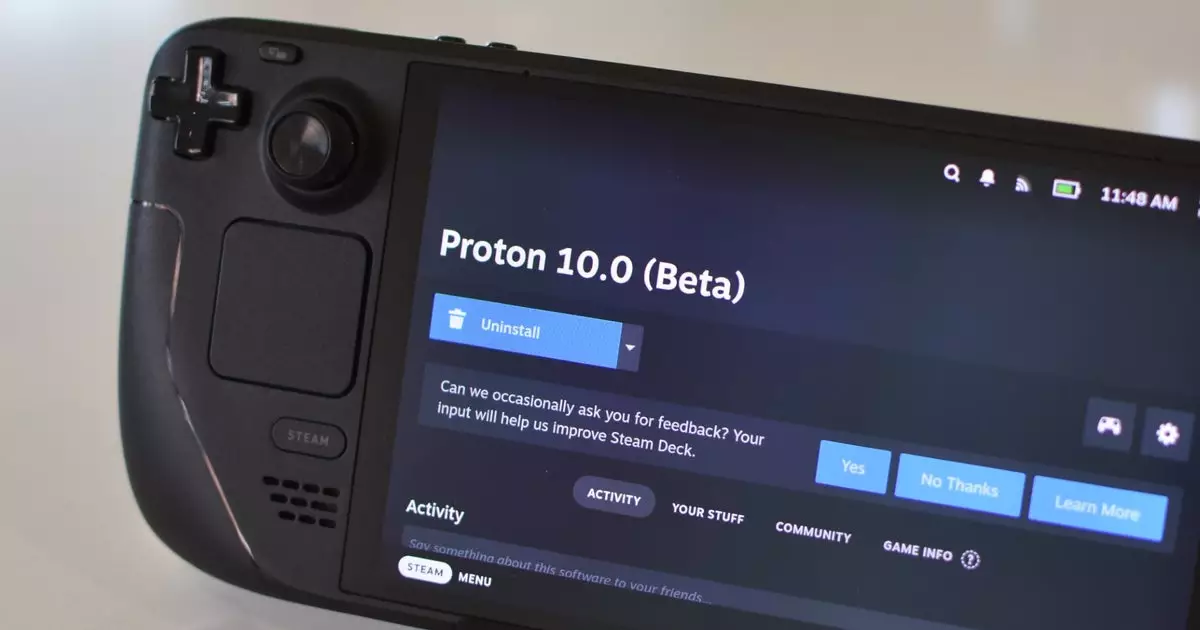After a lengthy hiatus that has left gamers eager for advancements, Proton has delivered a seismic update with the release of Proton 10.0 in beta form. As a collaborative effort by Valve and CodeWeavers, this compatibility layer is specifically designed to allow Windows-based games to thrive on Linux—all while forming the backbone of the Steam Deck’s gaming experience. This new installment signifies more than just an incremental build; it’s a critical step towards solidifying Linux’s place in the gaming ecosystem. The implications are substantial, and they promise to reshape how gamers interact with their software’s compatibility on non-Windows devices.
Upon diving into the details of Proton 10.0, one can’t help but be intrigued by the extent of its compatibility fixes. The developers seem to have covered a vast landscape of popular titles, including mainstream heavy-hitters like “Assassin’s Creed Shadows,” “Grand Theft Auto V Enhanced,” and “XCOM 2.” These adjustments reflect a serious commitment to addressing specific issues that have long hampered gamers’ experiences on Linux platforms. The sheer volume of support, beyond mere numbers, reveals a potent truth: robust gaming performance on Linux is no longer a far-off dream but rather a burgeoning reality.
Redefining Compatibility for Iconic Titles
Perhaps the most exciting aspect of Proton 10.0 is its transformative potential for games previously tagged as Unsupported on the Steam Deck. Consider the highlighted examples: “Microsoft Flight Simulator 2024” and “Batman: Arkham Asylum – Game of the Year Edition.” With the release of this beta, we witness the curtain rising on a new era where titles once barred from seamless integration could soon grace the libraries of Linux players. Testing “Arkham Asylum” through Proton 10.0 already revealed a stunning level of functionality that was absent in its predecessor, Proton 9. These kinds of improvements embody a seismic shift in users’ gaming capabilities and reinforce the notion that Linux can, indeed, take on the heavyweights of the industry.
Beyond just gaming’s elite blockbusters, it’s important to note that Proton 10.0 doesn’t just cater to the Steam Deck crowd. The accompanying patch notes reveal it has also focused on enhancing gameplay for desktop users, addressing compatibility issues across various titles and hardware configurations. For instance, fixes for games like “Stalker 2” and “Marvel Rivals” that previously struggled on Intel GPUs are invaluable. The focus on inclusivity within the Linux gaming community showcases how serious these developers are about ensuring that gaming on Linux is accessible and enjoyable for all users, regardless of their hardware setup.
Polished Performance vs. Experimental Solutions
While Proton Experimental and Proton GE have done admirable work in expanding compatibility, Proton 10.0 Beta illustrates the distinguished quality of the official releases. These beta versions are not only more polished but also come without the hassles of technical adjustments often necessary with community-driven alternatives. Users won’t have to venture into the Steam Deck’s Desktop Mode or navigate complex setups to experience the improvements. It’s apparent that even in its beta phase, Proton 10.0 offers a user-friendly approach, which may serve to attract more gamers toward Linux gaming.
The ease of installation further stimulates interest for those who have faced compatibility challenges. By simply searching for the Proton 10.0 beta in their Steam library, users can download it seamlessly, treating it like any other game. This user-centric approach encapsulates the ongoing evolution of Linux gaming and emphasizes a shift towards acknowledging gamers’ needs and experiences.
Proton 10.0 is shaping up to be a watershed moment for Linux gamers, and while I don’t claim neutrality in my evaluation, the excitement surrounding this update is palpable. With substantial improvements in compatibility, user-friendly execution, and significant promise for the future, it is clear that Valve and CodeWeavers are listening to their community. The path to serious gaming on Linux is being paved, and it’s time for gamers—whether on the Steam Deck or desktop—to embrace what’s possible.

